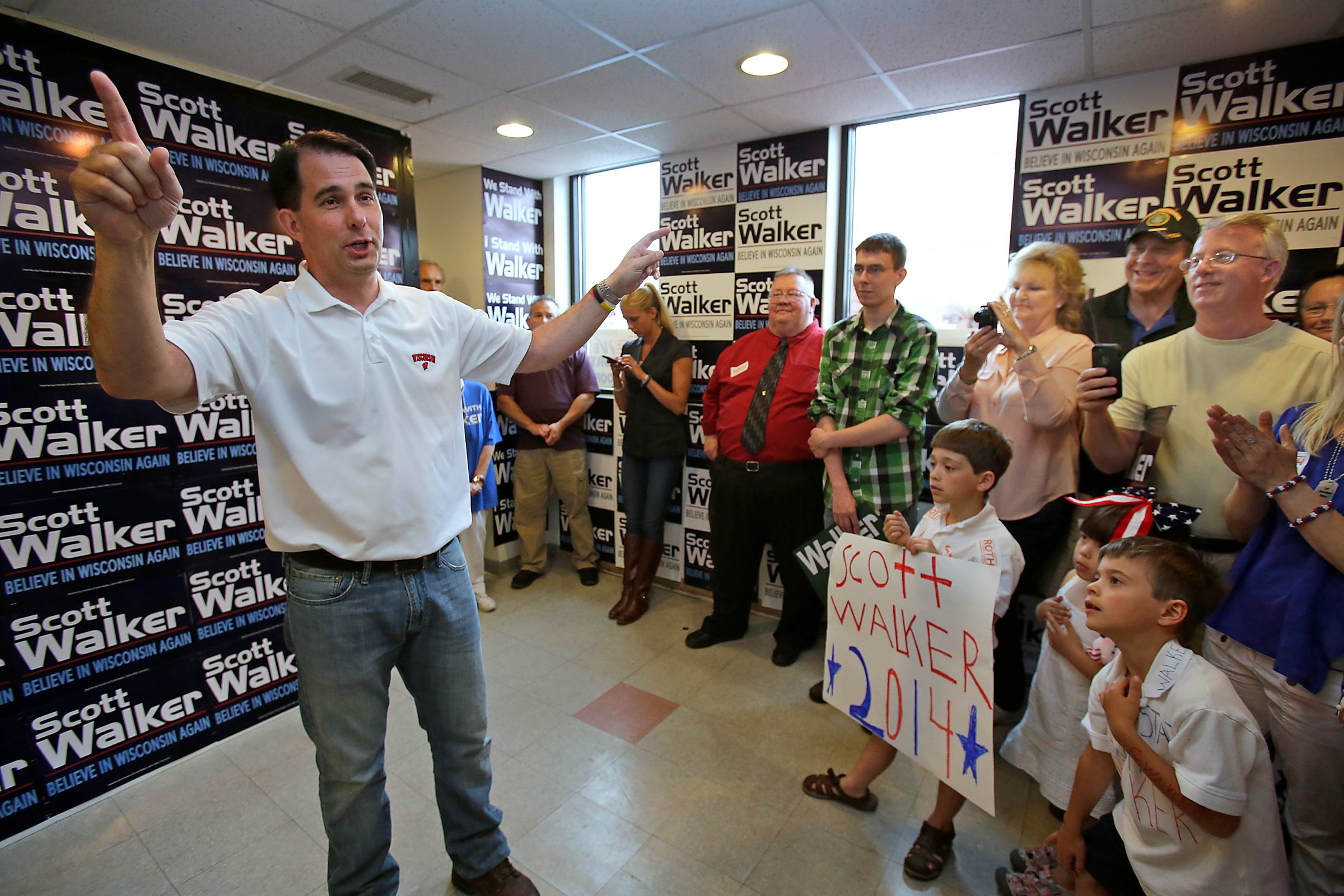
Wisconsin has hosted perhaps the nation’s best political circus in recent years, full of recall elections, lawmakers crossing state lines to avoid votes, and angry mobs of protesters occupying the capitol. But the latest attraction contains the seeds of a legal argument that could reverberate far beyond Madison.
Local prosecutors been building a case around the possibility that Wisconsin Gov. Scott Walker was part of a “criminal scheme” to illegally coordinate spending with conservative groups that helped him survive those recall attempts. Walker has not yet been charged, and he may never be. In recent months, the conservative groups have fought back by arguing in court that the prosecutors are politically-motivated and basing their case on a flawed reading of the law. A state and a federal judge have so far agreed, stopping the investigation as appellate courts review the matter.
What comes next could have big consequences for how candidates behave in the rest of the country. That’s because in his May 6 decision blocking the probe, federal judge Rudolph Randa ruled that the U.S. Constitution gives candidates and outside groups a First Amendment right to coordinate spending on advertising, unless the money is used to expressly advocate for the election or defeat of a candidate. “Only limited intrusions into the First Amendment are permitted to advance the government’s narrow interest in preventing quid pro quo corruption and then only as it relates to express advocacy speech,” Randa wrote. “As other histories tell us, attempts to purify the public square lead to places like the Guillotine and the Gulag.”
This constitutional argument could have big implications for federal campaign finance law, which currently does not follow Randa’s reading of the constitution. The Federal Election Commission currently bans coordination between candidates and outside groups on ads that just mention candidates in the weeks before election, even if the ads do not explicitly call for their election or defeat. This is the reason why President Barack Obama did not coordinate his advertising with labor unions or Super PACs backed by wealthy liberals in the last campaign, and why Mitt Romney did not huddle with Sheldon Adelson during his campaign to discuss strategy.
“There is the potential here for the 7th Circuit to confront what is federal coordination,” says election law attorney Trevor Potter, who is critical of the Randa decision. “That sounds like a Supreme Court case.”
And the Supreme Court has not been kind to campaign finance restrictions in recent years. The justices have tossed individual contribution limits and undone rules limiting the political spending of corporations, unions and the wealthy. Should the court take up the Wisconsin case, the next step could be allowing lawmakers to plan campaign strategy with the Sierra Club or the U.S. Chamber of Commerce. No middleman required.
For many conservative campaign finance experts, this is an obvious next step, given the current direction of Constitutional law. They argue that the current FEC regulations, which arise out of 2002 campaign finance reform legislation, will not withstand constitutional scrutiny. “They can try to enforce that,” says Hans van Spakovsky, a former FEC commissioner who supports the Randa ruling. “But if they end up in court they are going to lose that case.”
Coordination cases in campaign finance law are rare, since they require clear evidence of discussions that happen in back rooms. The case in Wisconsin is further complicated by the fact that state law is far less precise than federal law when it comes to what kinds of coordination are allowed.
But the 7th Circuit now clearly has an opportunity to test the federal law. And candidates for federal office, who increasingly rely on outside groups they cannot strategize with directly to get them elected, have reason to hope that the rules will someday change.
More Must-Reads from TIME
- Donald Trump Is TIME's 2024 Person of the Year
- Why We Chose Trump as Person of the Year
- Is Intermittent Fasting Good or Bad for You?
- The 100 Must-Read Books of 2024
- The 20 Best Christmas TV Episodes
- Column: If Optimism Feels Ridiculous Now, Try Hope
- The Future of Climate Action Is Trade Policy
- Merle Bombardieri Is Helping People Make the Baby Decision
Contact us at letters@time.com